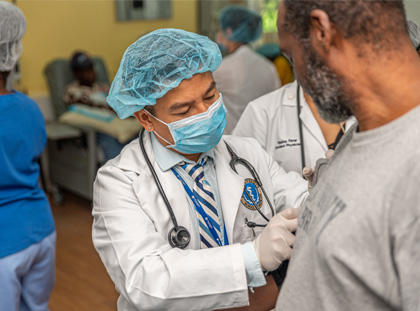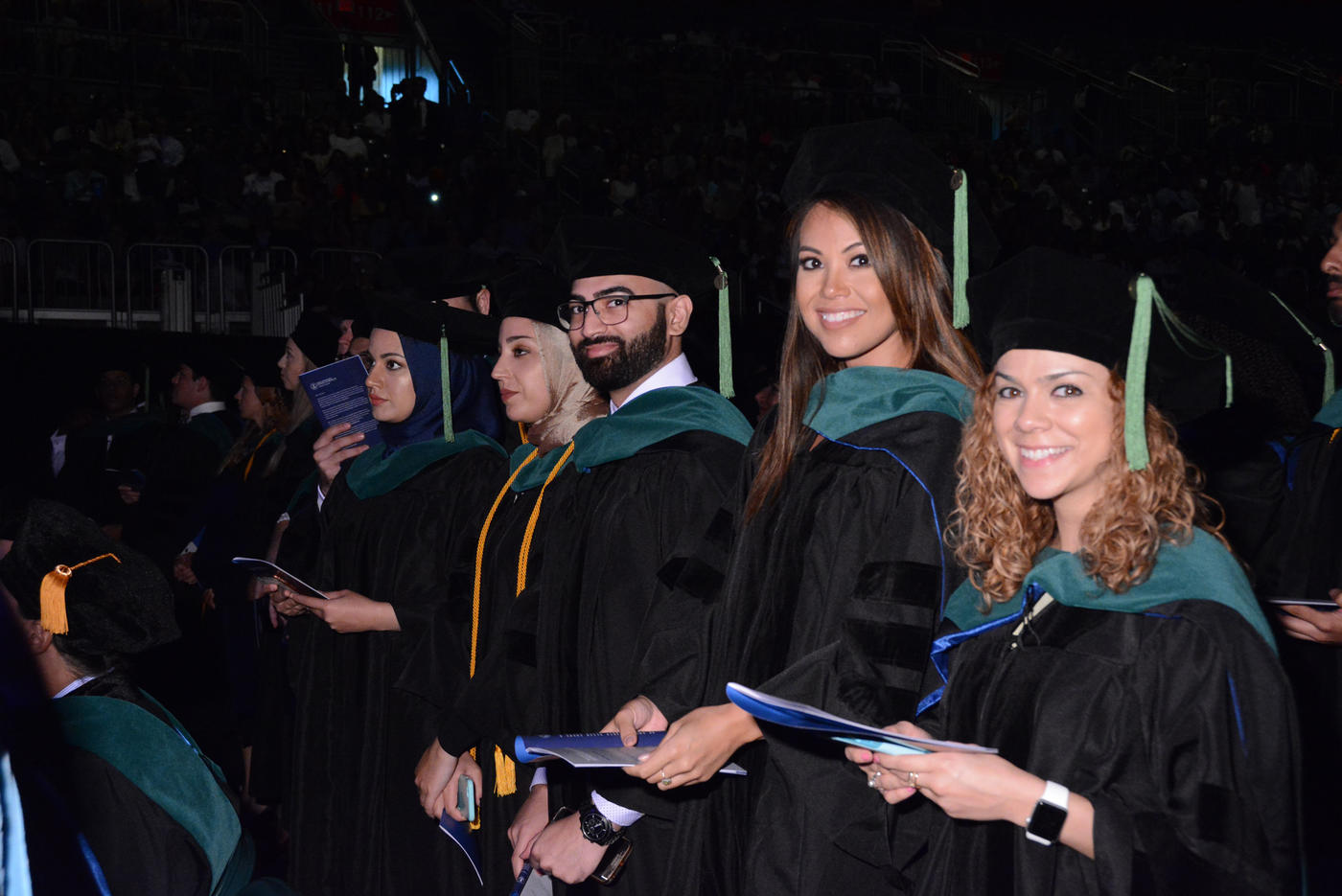Graduating from an accredited medical school—such as Ross University School of Medicine (RUSM)*—and gaining a medical license are terrific accomplishments, but they serve only as the entryway into the demanding world of professional medicine. After acquiring the skills needed to be a doctor, one must also try to be a good doctor. But what skills do doctors need to rise above others? What are the talents and factors that make a good physician? All doctors have medical ability and knowledge, but certain doctor skills and traits may highlight one practitioner over another—even determine if a doctor is considered “good” or better than others.
Medical colleagues may value a doctor’s intelligence and integrity, the ability to help others, and personal ethical practices, but patients often focus more on a physician’s communication skills and bedside manner. Below, we will examine the skills needed to be a doctor, as well as the qualities and behaviors that help physicians cultivate these skills.
Skills Needed To Be A physician
When considering the skills to be a good doctor, one must expand on the crucial center of medical ability and knowledge. Physicians spend much of their time interacting with people who are often in sensitive or vulnerable positions. Doctors must be able to provide medical care while also supporting patients and delivering sometimes difficult-to-hear information. If you can check off each of the following abilities, you may have the skills to be a good doctor.
Empathy
Empathy is the ability to understand and appreciate the emotions and feelings of others. Empathy is among the vital doctor skills. Patients and their families are often in difficult, life-changing, or stressful situations, and doctors should provide care in a way that meets both the physical and emotional needs of their patients.
Empathy is not just important for emotional reasons. Research shows that having an empathetic bedside manner may play a more important role in reducing the risks of malpractice lawsuits than even following the standards of proper care. Empathetic physicians care for their patients’ physical and psychological well being, gaining patient trust and positively affecting patient outcomes.
Intelligence
It is no secret that a medical education is intellectually demanding. The human body is incredibly complex, and doctors must be experts in a wide range of medical knowledge and know how to apply it. Intelligence and academic success are indeed skills required to be a good doctor.
Intelligence is very important for the actual process of becoming a doctor, but all practicing physicians must also keep up with new research and discoveries and be able to apply new knowledge on a regular basis. Sharp and active minds help doctors successfully provide correct diagnoses and treatments for their patients.
Communication
While it may not be one of the more obvious doctor skills, communication is essential to being a good doctor. Communication is important for both sharing information with other healthcare workers and for educating and sharing news with patients and their families.
Because doctors play a leadership role in healthcare, they often give orders that others carry out. Clearly communicating their intentions and rationales will help ensure that the correct care is promptly provided by others. Good communication also provides patients with the information they need to understand their treatment plans and maintain good health.
Respectfulness
Having respect for other doctors, staff, and patients is an important consideration for any doctor. Doctors have more education than most people, creating the potential for arrogant or superior behavior.
Doctors may often be the smartest people in the room, but it is important for them to listen to and respect the opinions of others. Good physicians realize that although they may have decades of education and experience, others may still offer insights that they have not yet considered or have expertise in areas that they do not.
Professionalism
A professional demeanor is essential for any doctor. Society trusts doctors in a unique way because of the importance of what they do and their ability to do it. Acting professionally helps physicians continue to earn the trust of society and maintain confidence in the medical profession.
Professionalism also builds trust between doctors and their individual patients. Professionalism with each patient interaction will enhance patients’ reliance on a physician’s knowledge and expertise, which often leads to better health outcomes.
Skills needed To Be A Good Doctor
While the skills needed to be a doctor do involve aptitude in a variety of clinically-focused talents, medical students may find themselves wondering, “What skills do doctors need as far as character traits are concerned?” Character traits can influence success in medical school as well as in clinical practice.
Hard Working
With four years of undergraduate education, then four years of medical school, and then several years of intense residency, it is no wonder that being hard working is an essential character skill that doctors need. Even after the educational part of becoming a doctor is complete, physicians must often keep long hours and always work hard to keep their patients safe and healthy.
Confident
As the leader of their healthcare team, confidence is important for doctors. Confidence will come in part from the years of knowledge and experience that doctors accrue, but it also comes from the basic character of the human being who happened to become a doctor. By having confidence in your ability and decision making process, you will be well suited to lead a healthcare team and gain the trust of your patients.
Organized
A methodical, organized approach is essential when evaluating patients and sorting the information obtained from exams and patient records. Being organized is also important during the process of becoming a doctor, when you are expected to absorb large amounts of information and remember and apply it in the future. Being organized is an essential character trait for any doctor.
Resilient
A medical career comes with its share of hardships, and resilience is important for any doctor’s long-term success. Long hours, hard work, and stress can lead to burnout, a condition of emotional and physical exhaustion. Physicians must be able to bounce back from burnout, as well as when they face emotionally difficult circumstances. Delivering news about a fatal condition or having a patient die can be hard on a physician. Resilience is one of the more important character traits a doctor can have.
Putting Skills Into Practice
Having the skills needed to become a doctor is only helpful when coupled with an educational program that can help you develop these skills and put them into practice. Choosing a medical school that understands your abilities can help you grow the skills to be a good doctor and allow you to practice medicine at a high level.
If you think you have the qualities and traits listed above, find out more about Ross Med’s MD program. If you have already decided that a career as a physician is for you, apply to RUSM today!
Related Resources:
*Ross University School of Medicine is accredited by the Caribbean Accreditation Authority for Education in Medicine and other Health Professions (CAAM-HP, www.caam-hp.org).
CAAM-HP is the legally constituted body established in 2003 under the aegis of the Caribbean Community (CARICOM), empowered to determine and prescribe standards and to accredit programs of medical, dental, veterinary and other health professions education on behalf of the contracting parties in CARICOM.
Accreditation by CAAM-HP is a rigorous, peer review process which examines all aspects of a medical program. The CAAM-HP board, an independent and autonomous body of professionals, only certifies medical schools which are operating at the highest levels of industry standards.
Through this accreditation, the CAAM-HP provides assurance to medical students, graduates, the medical profession, healthcare institutions and the public that programs leading to qualifications in medicine meet appropriate national and international standards for educational quality, and that the graduates have a sufficiently complete and valid educational experience.



